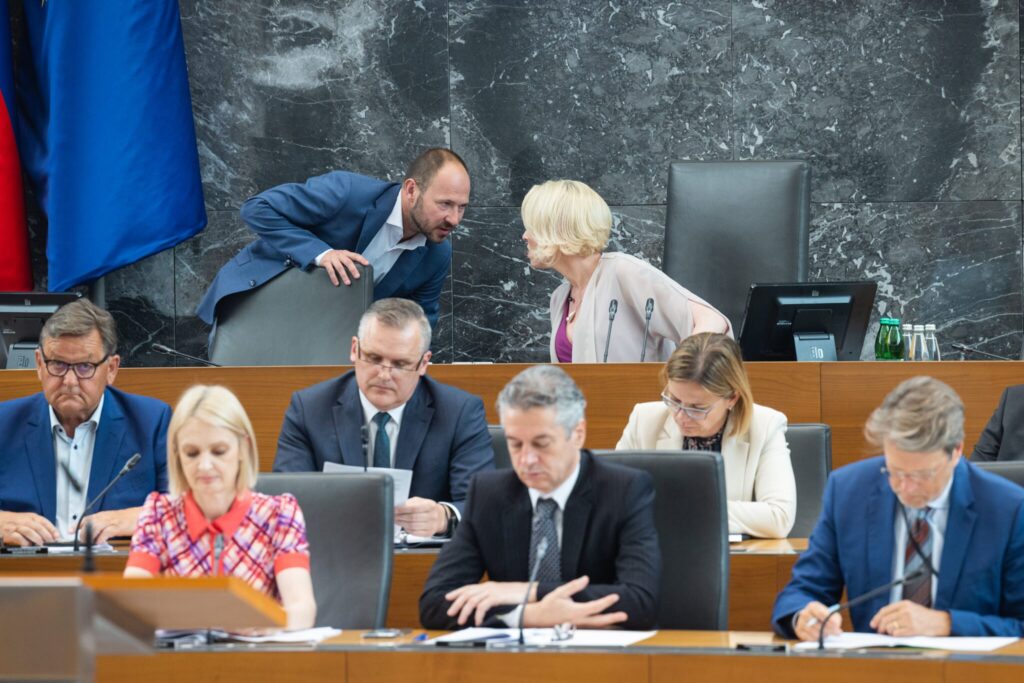“The liberties that the largest coalition party is taking in this mandate because of its voting power are unlike anything the National Assembly has ever seen before,” says MP Jelka Godec, leader of the Slovenian Democratic Party (Slovenska demokratska stranka – SDS) parliamentary group. She believes that the SDS party is doing its job actively and responsibly, but that the National Assembly is “often walking the line of democratic decision-making” because of the Golob government’s constant practice of rejecting compromises. The leader of the New Slovenia party (Nova Slovenija – NSi) parliamentary group, Janez Cigler Kralj, also believes that individual moves are the result of political pressure from the opposition and an ineffective government, reports the Slovenian Press Agency (Slovenska tiskovna agencija – STA).
Since the Golob government took office, the opposition SDS party has continuously stressed its willingness to cooperate with it, but according to MP Jelka Godec, the Golob government is “strong only in terms of words but not in deeds.” And this is clear for all to see from all the unfulfilled promises so far. She pointed out that the SDS party MPs had tabled numerous parliamentary questions and initiatives, as well as several bills, which, although rejected by the coalition, had been taken into account, because, in her words, they had then been “tabled and approved by the coalition in almost the same form.” The leader of the NSi, parliamentary group, Janez Cigler Kralj, also stressed the willingness to cooperate, however, no cooperation ever actually happened.
Regarding the work of the Speaker of the National Assembly, Urška Klakočar Zupančič, the SDS party believes that “they cannot find common ground,” and that they remain on opposite sides on several issues concerning the way the National Assembly is run. Godec believes that her behaviour has led to the National Assembly being “on the verge of complete anarchism on several occasions, however, none of that is visible from the outside.” According to the Slovenian Press Agency, Godec says that the current coalition’s legislative proposals in the field of healthcare seem to be incomplete or even written ad hoc, only because of the need to “follow the timetable that the coalition has set for itself for their implementation,” which she considers a mistake, because healthcare does not need likeable and forced actions, but actions and laws that will bring healthcare out of the crisis, she warns.
Nothing new is expected after the departure of former Health Minister Bešič Loredan
With the recent announcement of Prime Minister Robert Golob, who took over the leadership of the Ministry of Health after the resignation of Health Minister Danijel Bešič Loredan, that they will continue with the healthcare reform in the same way that they initially set out, the SDS party is wondering whether anything new can be expected from the government at all. In their opinion, it is obvious that the promises made to save the healthcare system were populist and misleading, and the planned measures have no real basis and seem as if they came from someone with no knowledge of the existing situation.
“The problem is the management – namely, the management of all sources of money, human resources and the organisation of work in public institutions,” said Cigler Kralj, who also sees healthcare as a key area for change. He thought that the proposals of former Minister Danijel Bešič Loredan were mostly good, but the implementation did not go as planned. Therefore, the NSi party accused the Prime Minister Robert Golob of choosing the path of strengthening the state-owned healthcare service, while the government coalition, according to Cigler Kralj, has the misguided idea that additional money can solve the problems of our healthcare.
If the government continues to be uncooperative, we will face many challenges in autumn
MP Godec stressed that the situation in autumn will largely depend on the moves of the Golob government, among which she points to healthcare and social care as key challenges, as well as the handling of budget documents that “raise concerns about the rising public debt, cuts in funding for important investments and increased spending on non-governmental organisations.” She did not rule out a reconstruction of the government but assured that the SDS party will continue to play an active role while monitoring the work of the government and holding it accountable. The leader of the NSi party also remains unoptimistic, believing that “if the government continues to behave in such a non-operational manner, out of touch with the people and real life,” we will face major challenges in autumn. He also pointed out that the most urgent tasks are now the preparation of all the by-laws for the implementation of the Long-Term Care Act, as well as the preparation of the conditions for the construction of the second block of the Krško nuclear power plant, as well as restarting or continuing the healthcare reform.
Ana Horvat


